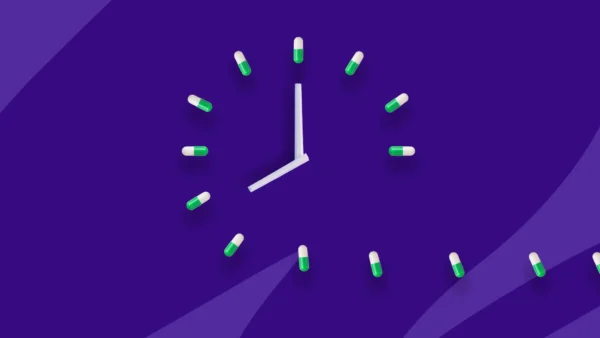Key takeaways
Ibuprofen can reduce symptoms of a toothache but not cure the problem.
Ibuprofen is fast-acting, with results within as little as 20-30 minutes.
Taking a non-prescription NSAID is much safer than using opioids for dental pain.
Homeopathic remedies such as clove oil and salt water rinse may help reduce toothache pain.
Seek help immediately if tooth pain is unbearable and accompanied by fever and chills.
Ibuprofen, a non-steroidal anti-inflammatory drug (NSAID), can be an excellent choice of over-the-counter (OTC) medication to reduce toothache pain. Dr. Thomas Potinen, Physician at Midwest Anesthesia and Pain Specialist in Chicago, states, “Ibuprofen is a great solution for alleviating tooth pain with proven efficacy and reliability.” While ibuprofen is a fast-acting medicine, it will only help reduce pain and inflammation associated with the toothache but not cure the problem.
Does ibuprofen help with tooth pain?
Ibuprofen may temporarily relieve pain, including toothaches. According to Dr. Tarandeep Sidivra, Owner and Principal Dentist at South Oak Dental, “Ibuprofen can help temporarily relieve tooth pain for some people, but it should not be viewed as a permanent solution or substitute for dental care. Ibuprofen may help decrease discomfort from toothaches, abscesses, or other dental issues; however, the underlying condition still needs to be addressed to prevent the pain from returning or worsening.“
Dental pain could involve teeth, gums, jaw, ear, and the general area of the head. Swelling directly around a tooth or swelling to the jaw and face may occur. If swelling goes towards the eye or below the chin, the patient needs to be seen by a medical professional. Ibuprofen can help stop the production of prostaglandins, a chemical that signals the body to experience inflammation, pain, and fever. Children and adults can benefit from this non-prescription medication to manage dental pain. Oral discomfort could result from numerous dental problems, including an infection, cavity, abscess, dental injury, or loose filling.
Ibuprofen could be beneficial following dental procedures as well. Tooth extraction, dental implants, root canal treatment, wisdom tooth removal, or other forms of dentistry could require pain medication. Although ibuprofen is often recommended to treat painful symptoms, consult a healthcare provider or dentist for diagnosis and treatment.
How fast does ibuprofen work for toothaches?
Ibuprofen is a fast-acting medicine, and results may be noticed within 20 to 30 minutes of consuming it. The half-life of ibuprofen is approximately two hours, allowing the patient to take doses every four to six hours as needed. Doses may vary based on age and level of discomfort experienced. Consult a medical professional before giving ibuprofen to a child for dental pain, as the dosage may vary from what is recommended on the label.
How often should you take ibuprofen for a toothache?
For toothache relief, take ibuprofen every 4 to 6 hours. The standard dosage is 200-400 mg. Individuals should not consume more than 1,200 mg (OCT) within 24 hours or 3,200 mg (prescription) within 24 hours. Ibuprofen comes in various strengths and can even be a prescription strength. This medicine is also available in capsule, tablet, chewable, and liquid form. Liquid and chewable ibuprofen can be used for those who may have difficulty swallowing pills, like children and older adults.
A slow-release form of ibuprofen is available in various units, including 800 mg. Consult a pharmacist, dentist, or healthcare provider on how much and when to take this medicine. Taking too much ibuprofen could have negative side effects, such as difficulty breathing, stomach pain, and vomiting. Seek medical attention if there is blood in the vomit or if the patient’s stool is black. The stomach lining could be bleeding.
Ibuprofen alternatives for toothaches
For severe dental pain, ibuprofen is recommended in conjunction with stronger prescription medication. Opioids such as hydrocodone, oxycodone, and codeine are among the prescription drugs often used to treat serious dental pain in adults. A recent study confirmed that codeine prescribed for dental pain risks addiction or misuse. Opioids are addictive, dangerous, and often abused. Opioids are for short-term use, usually following painful dental procedures. Avoid the use of opiates when possible and use OTC medications as directed.
Advil and Motrin are brand names of ibuprofen. Naproxen is another pain reliever and anti-inflammatory drug similar to ibuprofen. Typically, ibuprofen provides faster relief, but naproxen tends to last twice as long 8 to 12 hours. Acetaminophen, or Tylenol, can be used to treat painful toothache symptoms. Ask a healthcare provider about which pain reliever is best for your situation.
If dental pain is severe, the 3-3-3 method could help until your dentist appointment. The 3-3-3 method suggests taking three ibuprofen, Motrin, or Advil three times a day for three days. This is a temporary solution. Side effects of taking too much ibuprofen can damage the digestive system and, in rare cases, even be deadly
Home remedies are also helpful when seeking toothache relief. Simple methods such as gargling with warm salt water, applying a cold compress to the jaw or gums, or using hydrogen peroxide to flush the mouth can be soothing and reduce pain. Peppermint tea contains menthol, a natural analgesic that can cool inflamed gums and slightly numb them. A warm tea bag, mint or chamomile, can be placed on the affected area as a compress.
Clove oil is another homeopathic choice for oral health care. Clove oil is often found in over-the-counter medications for dental pain management. Various methods to treat oral pain can help reduce pain and heal faster. Consult a dentist or doctor before using home remedies to ensure safety and prevent further damage.
Some tooth pain may clear on its own. Schedule a dentist appointment for ongoing dental pain and discomfort or minor injuries. Seek help immediately for major injuries or severe (unbearable) pain with fever and chills; this could be a dental emergency. In rare cases, an oral infection could enter the bloodstream and spread throughout the body.
Sources
- Pain relief – ibuprofen, DailyMed (2022)
- New guideline details dental pain management strategies for pediatric patients, American Dental Association (2023)
- Pain management for dentists: The role of ibuprofen, National Library of Medicine (2012)
- Codeine for acute dental pain and acute pain related to dental procedures, American Dental Association (2021)
- Toothache: Symptoms, causes, and remedies, Cleveland Clinic (2023)











